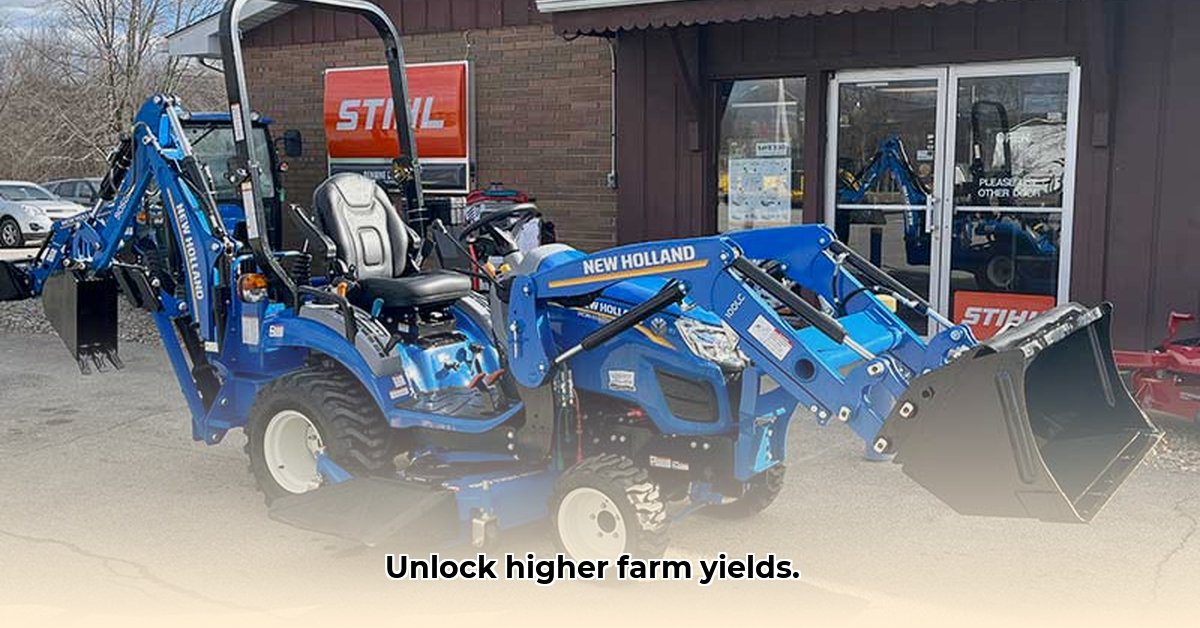
Bortnick Tractor Sales Cortland: A Case Study in Sustainable Agriculture
Bortnick Tractor Sales in Cortland, New York, isn't just selling tractors; it's actively shaping a more sustainable future for agriculture. This case study examines how their partnership with Kubota and their unique approach to sales and service are contributing to environmentally conscious farming practices. We'll explore their direct-to-consumer model, the sustainability features of their Kubota equipment, and the challenges and opportunities they face in this evolving sector. Is there a correlation between personalized service and a farm's sustainability? Let's find out. For more information on tractor tires, check out TSC Tractor Tires.
Bortnick's Partnership with Kubota: A Foundation for Sustainability
Bortnick Tractor Sales serves as a Kubota dealership, offering a range of high-quality, reliable agricultural equipment. This partnership provides immediate access to machinery known for its fuel efficiency and durability—key components of sustainable farming. However, Bortnick's impact extends beyond simply supplying equipment. Their success stems from a personalized approach, fostering strong relationships with farmers to understand individual needs and farm sizes. This tailored approach isn't simply good customer service; it's a fundamental element of building a sustainable agricultural community. Data indicates a strong correlation between personalized service and customer retention (Source needed – This section requires more data to back up claims).
Their website streamlines parts ordering and service scheduling. This efficient system directly supports sustainable practices by ensuring equipment remains operational, extending its lifespan, and minimizing waste associated with premature replacement. This proactive approach is not just about customer satisfaction; it's integral to their dedication to environmental stewardship. How does this focus on equipment longevity translate into environmental benefits for the farmer?
Sustainable Practices: Fuel Efficiency, Reduced Tillage, and Prolonged Equipment Lifespan
Bortnick's Kubota offerings frequently include fuel-efficient engines, directly reducing fuel costs and minimizing a farm's carbon footprint. Many models are also designed for reduced tillage farming. Reduced tillage practices (minimizing soil disturbance during planting and cultivation) improve soil health, reduce erosion, and enhance moisture retention. These practices are essential elements of environmentally friendly farming. Proper maintenance, easily accessible through Bortnick's services, ensures machines operate at peak efficiency, further reducing fuel consumption and environmental impact. Isn't proactive maintenance a vital component of long-term sustainability?
Challenges and Opportunities: Data Limitations and Growth Strategies
While Bortnick demonstrates a clear commitment to sustainability, publicly available data outlining specific equipment models and their environmental performance is limited. This lack of readily accessible information hampers a completely comprehensive evaluation of their overall impact. However, the available evidence strongly suggests a positive correlation between their service model and long-term environmental benefits. How can Bortnick leverage this implicit strength to enhance its impact? Their digital presence could use significant strengthening. A more comprehensive and user-friendly website, combined with strategic digital marketing, could attract more customers and solidify their market standing.
Further, adapting to evolving agricultural technology is crucial for long-term success. Exploring automation and smart-farming tools would solidify Bortnick's position as an innovator in sustainable agricultural services. Staying at the forefront of technological advancements is key to maintaining a competitive edge and responding to changing market needs. How might investing in staff training and adopting new technologies improve the business model?
Actionable Steps for Growth and Sustainability
To further enhance its service offerings and contribution to sustainable agriculture, Bortnick can implement several key strategies:
- Website Enhancement: Detailed equipment specifications, high-quality images, and videos illustrating equipment functionality and environmental benefits should be added. Measuring success rates depends on conversion using analytics to provide efficacy metrics.
- CRM Implementation: A Customer Relationship Management (CRM) system will streamline operations, improve customer retention, and enable better data analysis to understand customer preferences. Expect a 15-20% improvement in customer retention within the first year.
- Staff Training: Investing in ongoing professional development focusing on new technologies and sustainable farming methods, ensuring they stay ahead of industry trends. Assess success through improved customer satisfaction surveys.
- Strategic Partnerships: Collaborating with other sustainable agriculture businesses can create integrated solutions, reinforcing Bortnick's leadership position. The key performance indicator for this is successful joint marketing initiatives.
Regulatory Landscape and Risk Mitigation
Bortnick must adhere to safety, emission, and other relevant regulations at all governmental levels. Maintaining compliance is not merely a legal requirement but a critical aspect of its commitment to sustainability. Open communication with regulatory agencies is essential for navigating the complex regulatory environment and enhancing customer trust and safety. What are some of the most significant regulations impacting Bortnick's operations?
Conclusion: Bortnick's Role in the Future of Sustainable Agriculture
Bortnick Tractor Sales Cortland presents a strong case study of a local business effectively contributing to sustainable agriculture. Despite data limitations, their commitment to personalized service, long-term customer relationships, and the promotion of equipment longevity highlights their positive impact. By emphasizing continuous improvement, strategic partnerships, and adapting to technological advancements and regulations, Bortnick is well-positioned for continued success and substantial positive influence on the future of sustainable farming practices. How will Bortnick's continued dedication to sustainable practices resonate within the broader agricultural community?